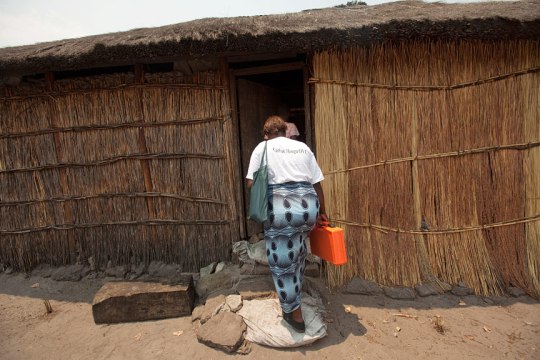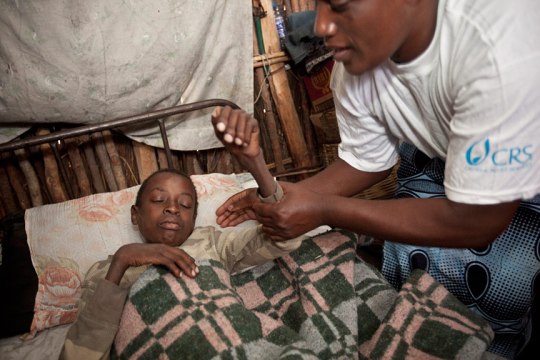It can be said that young people have suffered the most from the effects of HIV in Africa. The disease took a devastating toll on the population of Zambia, wiping out nearly a generation of the most economically active and productive members of society, those 20 to 40 years old. But it is the young who are left behind, often to fend for themselves and cope with a disease that is to be their only inheritance. With an HIV prevalence rate of 20%, Mongu District in western Zambia is one of the areas hardest hit by HIV in the country. Below, Nurse Idah Jangazya collects blood samples during a monthly HIV screening clinic at Mindolo Clinic in Kitwe, Zambia.
Gertrude Nyambe is a 41 year-old mother of five living in Mongu. At the age of 35 she and her husband were diagnosed with HIV. He succumbed to the disease soon after. After enrolling in an anti-retroviral (ARV) therapy program, Gertrude decided she would work to fight the spread of the disease in her community and support those who had fallen victim to it.
Today Gertrude is a caregiver with Catholic Relief Services‘ STEPS OVC program (Sustainability Through Economic Strengthening, Prevention and Support for Orphans and Vulnerable Children). She spends at least two days of every week making rounds to community members affected by the disease, paying special attention to younger individuals. On her home visits she ensures HIV positive patients are adhering to their anti-retroviral therapy, eating balanced diets, and being connected to government health and welfare services. She strikes up conversations about HIV with young people on the street, sharing prevention tips. Below, Mukelabai Silimina (82, left) had twelve children, seven of whom have passed away due to AIDS-related illness. She now cares for six of her grandchildren, including Mwiya (16, left).
Gertrude also monitors the well-being of OVCs in the community, making sure they are performing well in school and not falling prey to abuse. Those that are older and not continuing on in higher education are often connected with a vocational training program. Though she is a volunteer, Gertrude treats her work as though it were a career. “This is my own way of fighting the disease,” she says. “I go out there and provide help to those that need it. Once I was in great pain, but through the help of others I was able to recover. Now I myself want to help those who are ill or in need of help like I was.”
Unlike years past, Gertrude’s work today has a dual focus: monitoring patients’ ARV adherence, and educating people about HIV prevention. “I encourage the OVCs in the community to postpone sexual activity, that they should abstain from sexual activity and concentrate on school… Our hope lies with the children.” Although she has been volunteering as a caregiver for a number of years, thanks to the availability of ARV medication, Gertrude’s workload is somewhat lighter than in the past. Although there are exceptions, most clients who had been bed-ridden and for whom she had cooked in the past are now out working and living normal lives.
Of the 22 homes that Gertrude visits each month, she spends most of her time with Muna Nyambe (no relation), dropping by four times a week. “Muna has improved since the time I met him and he was first enrolled in the program,” she tells me before we knock on the door and walk into the grass thatch house where he stays. Inside she finds 14-year old Muna, a boy who looks to be age 8 or 9, lying in a small bed that takes up most of the room.
At fourteen Muna is gentle and upbeat, yet weak and frail, so much so that he is unable to attend school. His father having passed away, Muna lives with his mother who is also HIV positive and must leave for work for ten hours each day. It was Gertrude that first identified Muna as an OVC in 2005, brought him in to be tested for HIV, and connected him with government services to receive subsequent ARV care. Muna’s mother was unaware such services existed. Linking Muna to government programs was critical, but Gertrude’s role hasn’t ended there. Today, she continues to be part of his life by bathing him and cooking for him when needed. She makes sure his appointments at the clinic are kept, often taking him there herself. She prays with Muna and his mother and has become an invaluable support to the family: “She encourages Muna to have hope that he can still live a normal life. She even encourages him to go outside and play a bit if he’s feeling well,” says Mufaweli Nyambe, Muna’s mother.
With over 2,100 caregiver volunteers like Gertrude working in the same capacity across Zambia, CRS‘ STEPS OVC is playing a crucial role in identifying, supporting, and empowering young and vulnerable people affected by HIV. At the same time the program is helping to reduce the spread of the disease by educating the community. “My own life has been able to bring positive change in other’s lives, especially those living with HIV,” Gertrude says. “I give them my life as an example. I give hope. I’m still able to do all the things that I was able to do before… I’m strong so they can also be strong and have hope for the future.”











